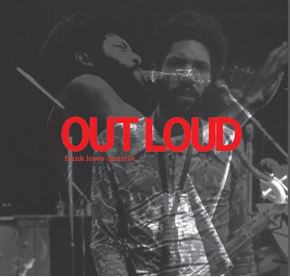By Paul Acquaro and Martin Schray
Before we start with the review let’s bow humbly before Joe Lizzi and Ben Young, the men behind Triple Point Records, a small label which has released only three albums so far. But these albums are Cecil Taylor’s/Tony Oxley’s double LP Ailanthus/Altissima (Taylor’s last release) and New York Art Quartet’s Call it Art, a five LP box set, for which the two were rightfully Grammy nominated – it is one of the most beautiful and simply greatest releases in the last two years as to music, design and liner notes (have a look here.
Their latest effort is Frank Lowe Quartet’s Outloud and sometimes packaging says a lot about an album. In times where so much is reduced to a click on some data, it’s a pleasure holding some cardboard, vinyl and glossy paper. One of the striking things is the bold design with crisp lettering and a striking orange, white and black color palette. The design carries through the 38-page booklet that accompanies the double album release. The booklet is packed with historical, biographical, and technical essays, along with wonderful black-and-white photography and scrapbook entries of concert posters and tickets stubs. There is also an online access code to rare video footage of the band in action.
Through the essays, a sense of who Lowe was (he passed away in 2003) is captured in passages like:
“Working at the Satellite record shop was the first of many record store jobs that Lowe would hold throughout his life. He was a music lover and inveterate record hound, and working in record shops give him access to more music that he could afford to own. Perhaps more importantly, it also provides an income when just play music could not pay the bills.”
And of the fabled New York loft scene of the 70s:
“No one made much money, sometimes just a few dollars for a night’s work, but there was a great hope that the money would eventually come if the music was strong and developed enough. Frank Lowe was at home in this nonstop setting. He threw himself into it wholeheartedly.”
These passages, among many others, help paint a picture of what music meant to Lowe and the context for the music being made. First of all, this double LP is a release from tapes made at Sam and Beatrice Rivers’ East Village loft and it is a gem rescued from the unforgiving entropy of time. Like much of the music from the Wildflowers: The New York Loft Jazz Sessions compilation from a around the same time and recorded at the same loft, the music here captures the zeitgeist and presents Frank Lowe as one of the most interesting musicians of that scene.
Out Loud’s concert dates were recorded after Black Beings (on ESP-disk) and before Lowe’s seminal album Fresh (on Arista). The group that Lowe (saxophones, flute, voice, percussion, balafon, whistles, harmonica, and miscellaneous small instruments) had assembled for the Out Loud recording dates included William Parker on bass, Steve Reid on drums, Joseph Bowie primarily on trombone and also featured a guest appearance by trumpeter Ahmed Abdullah. More raw and less programmatic than Fresh (which also had a slightly altered line up), the group plays with exuberance and joy throughout the four sides. Percussion, slide whistles, vocalizations and chants also capture the spirit of the times.
Lowe’s compositions on this album are influenced by Sun Ra’s percussive style (like drummer Steve Reid he was a member of the Arkestra) and integrated the Art Ensemble of Chicago’s African elements (he worked with Joseph Jarman on Black Beings and with Lester Bowie on Fresh) which he combines with his aggressive and fiery blues style. The most outstanding moments on this album are those when these structures crash into young William Parker’s bass ostinatos, relentlessly pushing the reeds, for example in “Untitled 2”, a fierce, angry social comment with Lowe even screaming and shouting; or in “Untitled 3”, where Lowe is challenged by Reid and Parker hunting him down a rollercoaster of musical emotions – blues cries that remind of Ayler, balladesque breathers, hardbop bass lines and ultra-fast drumming. When Ahmed Abdullah joins in, the rhythm section plays the same game with him.
And last but not least there is Joseph Bowie, then in his early twenties (in general it is amazing how young these musicians were). He accompanies Lowe like a loyal Sancho Pansa but he also fights him and the others in “Vivid Description” and especially in “Whew”, in which his trombone gives Lowe the crucial hints where the music should go.
Outloud is on par with Albert Ayler’s Holy Ghost: Rare And Unissued Recordings (1962-70), Bill Dixon’s Odyssey, William Parker’s Centering: Unreleased Early Recordings 1976-1987 and Joe McPhee’s Nation Time: The Complete Recordings (1969-70).
The album is available as a deluxe double vinyl edition, it is limited to 550 hand-numbered copies. It is expensive but it is worth every cent.
You can buy it from the label where you can also find a sound snippet.
Have a look at the photos and the booklet here.


